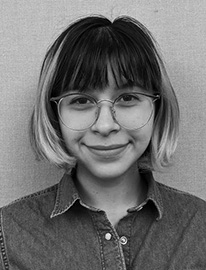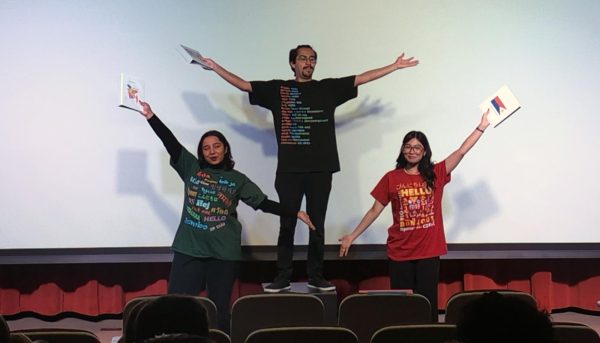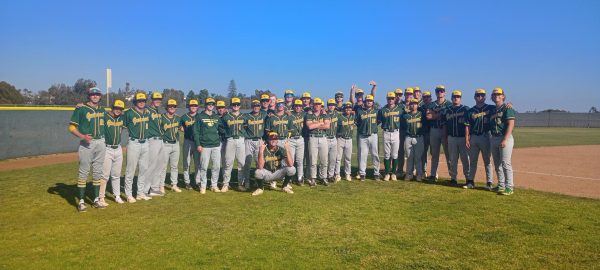New Chancellor Around the Corner
The finalists have been named but they still have a long way to go in the search process.
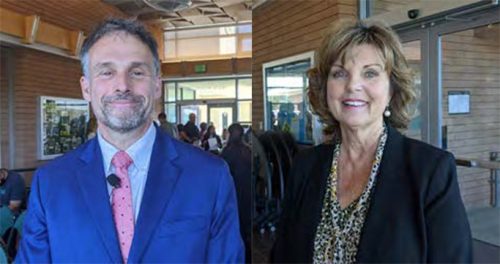
Finalists for Chancellor: Dr. David Potash (left) and Dr. Lynn Neault (right).
November 7, 2019
Dr. Cindy Miles, the chancellor of the Grossmont-Cuyamaca Community College District, has announced her retirement. The search has been underway to find her replacement. The new chancellor, who will be appointed by the district’s Governing Board, will begin Jan. 1.
Linda Cartwright, the president of the Governing Board, likened the chancellor to a manager of a business. The chancellor is appointed by the board and is “responsible for the quality and effectiveness of all the programs,” she said. “The chancellor provides leadership to the vice-chancellors, the president, the deans, faculty and staff.”
Under the direction of the chancellor, academic policy, planning and business affairs, faculty, student and staff affairs are managed. The chancellor also stays in contact with legislators to help educational bills that may be considered.
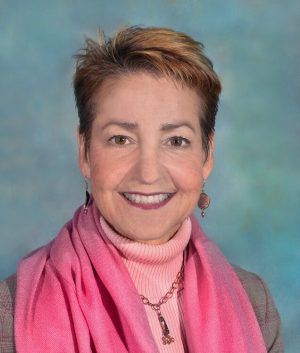
Current Chancellor, Cindy Miles slated for retirement Spring 2020.
“They set the overall policy of the district… so whatever the chancellor’s priorities are, those are the marching orders she gives out to the president and vice-chancellors to carry out,” said Jim Mahler, president of the American Federation of Teachers Local 1931, the union for Grossmont’s faculty.
The chancellor is in charge of both colleges. While Grossmont’s president, Dr. Nabil Abu-Ghazaleh, handles Grossmont’s affairs, the chancellor works for the entire district, including Grossmont and Cuyamaca Colleges.
Chancellors’ terms vary based on their contract. Often the terms the chancellor and board will agree upon will be three years, but it can be as little as a one-year term.
“She’s evaluated every year,” Cartwright said. “If we have to make adjustments in that term for whatever reason, the board has the option to do that.”
The chancellor meets with the Governing Board on a regular basis. “Before a board meeting, we talk to her about, you know, the issues that are going to be addressed. If we have things that we want put on the agenda we let (her) know about that,” Cartwright explained.
After this discussion, the board enters an open session where the public is invited. Any personal issues or other matters that need to be discussed in private are handled in closed session. In these sessions, the board and the chancellor “come to a consensus,” according to Cartwright.
The district is currently in the process of hiring a new chancellor. A search committee is “made up of stakeholders” Cartwright said. These people come from the district, community, and – in the case of one – from the student body. This committee put together a profile of what was desirable in a candidate. They then did a paper screening in which the candidates were rated based on their applications. Semi-finalist, Dr. Lynn Neault and Dr. David Potash, were then interviewed.
Neault is currently the vice-chancellor of Student Services for the San Diego Community College District. She has held that position for 25 years. On Nov. 4, she spoke at an open forum at Grossmont.
“I am our students. I am an immigrant, the daughter of immigrants, and the granddaughter of immigrants,” Neault said. “My parents moved to this country and we struggled to make ends meet. I was the first in my family to go to college.”
During the forum, she spoke often of students. “Our students come to us with barriers, many of which are unfathomable to us, but through it all we give them hope— hope for a better life,” she said. “I am the voice for the students who don’t have a voice.”
When a student asks for an exception in district policy, whether it be due to a teacher getting sick or books being unavailable, Neault allows that exception for the entire class. “Why just the student that has the courage and the wherewithal to come forward and ask for an exception in policy?” she said. When students are constantly receiving exemptions for degree requirements, she said she will recommend to the instructional leadership analysis of the requirements so all students may benefit from these exceptions.
In her current position, Neault worked to create a Dream Center and a Catalyst Grant that helped expand the dreamer centers at City and Mesa Colleges and allowed for one to be created at Miramar College. “The national rhetoric,” Neault said, “has really frightened a lot of our students, so all the more reason that we need to reach out to them with good information.”
Neault spoke about her good relations with the labor union on her campus, the same union that represents faculty in this district. “And that’s not because we always agree, but because I’m always willing to listen and they’re willing to listen and I always try to find common ground, to find areas of compromise,” she said. Dr. David Potash has been the president of Wilbur Wright College in Chicago since 2013. On Nov. 5, he spoke at his own open forum. “We represent in many ways what I think is the kind of opportunity of a better sort of place, for our communities, and also in the bigger picture for our country,” Potash said.
“Nothing of lasting value in higher ed is ever done alone,” said Potash. “There’s little decision making that I can think of… that doesn’t involve participatory governance.”
He explained he has college-wide retreats. “We make sure everyone is at the retreat and everyone is participating. That’s faculty, that’s administrators, that’s students, that’s the housekeeping, that’s security, all the rest. Does that mean that everybody has to spend the same amount of time? No, and there are certain groups that (have) significant more attention to a particular task and that but everybody comes together. And that’s one of the things that I really like and really care about in terms of higher education,” Potash said.
Potash made note of his work to obtain a grant to “provide direct support for undocumented students. “We start training faculty and staff,” he said. “I think we have done, in spite of all the outside challenges, a reasonably good, not enough, but reasonably good job providing a safe environment for our undocumented student.” Cartwright said she hopes the next chancellor will “continue to put students first… Somebody that’s going to work with everyone: students, faculty, staff, the community.” When asked what he hopes for in the next chancellor Mahler said, “Someone who understands how to actually collaborate with constituency groups.


